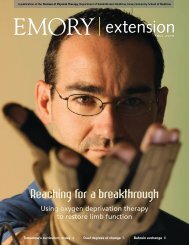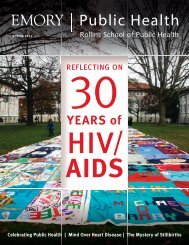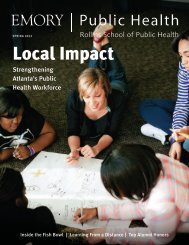returning quality to life - Woodruff Health Sciences Center - Emory ...
returning quality to life - Woodruff Health Sciences Center - Emory ...
returning quality to life - Woodruff Health Sciences Center - Emory ...
You also want an ePaper? Increase the reach of your titles
YUMPU automatically turns print PDFs into web optimized ePapers that Google loves.
SHE IS 33 YEARS OLD, unmarried, estranged<br />
from her immediate family, and raising two<br />
small children by herself.<br />
A few hours ago she found out she has<br />
stage IV, metastatic breast cancer.<br />
The prognosis is not good—maybe a year, perhaps a<br />
little more, <strong>to</strong> live. Then again, targeted chemotherapy<br />
and other treatment alternatives for advanced stage cancer<br />
patients have improved remarkably in recent years, and it<br />
could be she will beat the odds.<br />
From a clinician’s standpoint, her treatment team needs<br />
<strong>to</strong> know what she wants them <strong>to</strong> do. How aggressive in<br />
combating the cancer does she want them <strong>to</strong> be?<br />
But from the patient’s point of view, the questions she<br />
faces are more profoundly personal and, <strong>to</strong> her, more<br />
important: Who will take care of me? Who will take care<br />
of my children? How sick am I going <strong>to</strong> be? How much<br />
pain should I expect? What happens if nothing works and<br />
the cancer spreads even faster?<br />
<strong>returning</strong> <strong>quality</strong> <strong>to</strong> <strong>life</strong><br />
By Mike King • Illustrations by Brian Stauffer<br />
Getting help<br />
What is palliative care?<br />
How will I benefit from palliative care?<br />
When is the right time for this care?<br />
How does it differ from hospice care?<br />
To answer these questions and<br />
more, visit http://bit.ly/emorypalliative.<br />
In addition, the nonprofit group, Georgia<br />
<strong>Health</strong> Decisions, has created a planning<br />
guide—including the Georgia Advance<br />
Directive for <strong>Health</strong> Care—where the user<br />
can appoint someone <strong>to</strong> make his or her<br />
health care decisions and formally state<br />
what treatments he or she does or does<br />
not want <strong>to</strong> receive. The planning guide is<br />
available at <strong>Emory</strong>’s hospitals or at georgia-<br />
healthdecisions.org.<br />
Winter 2011 3
















